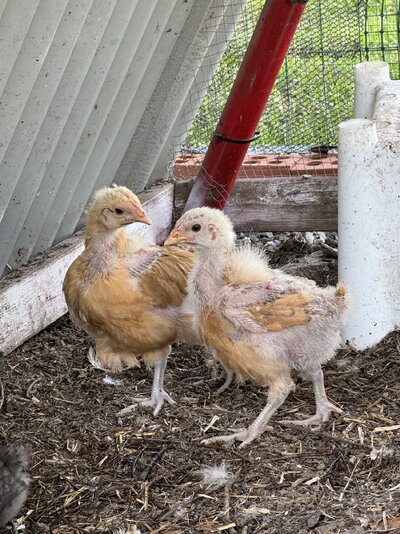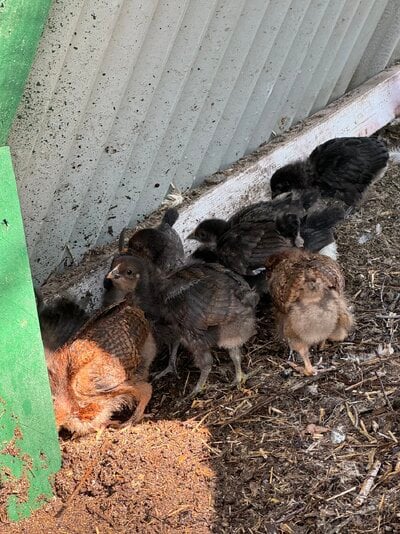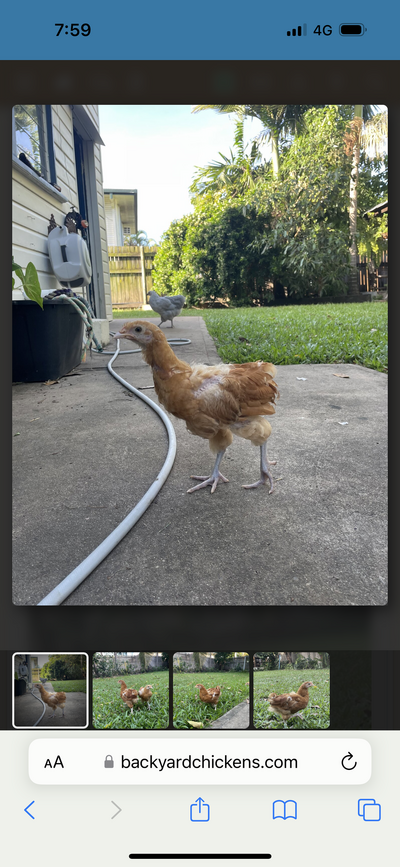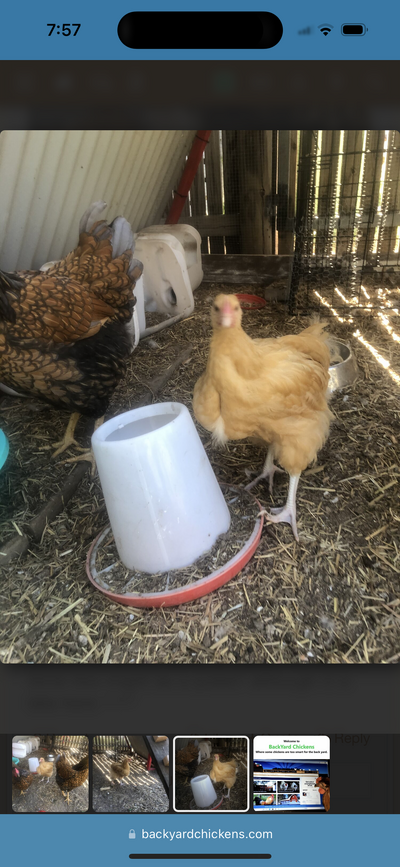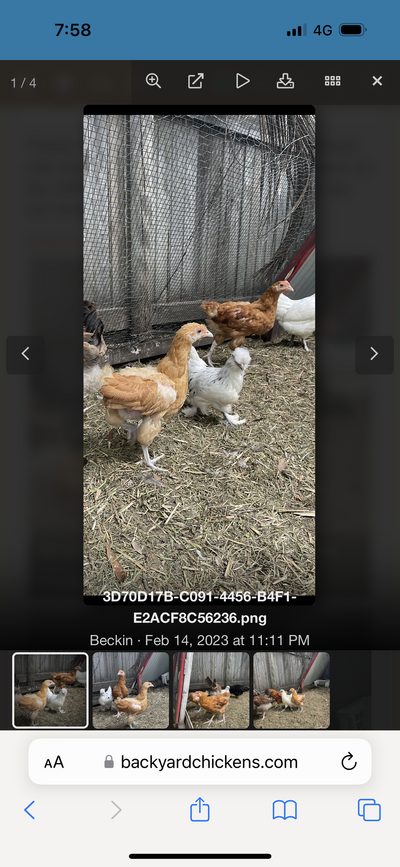Navigation
Install the app
How to install the app on iOS
Follow along with the video below to see how to install our site as a web app on your home screen.
Note: This feature may not be available in some browsers.
More options
You are using an out of date browser. It may not display this or other websites correctly.
You should upgrade or use an alternative browser.
You should upgrade or use an alternative browser.
Why do these chooks fail to thrive?
- Thread starter Beckin
- Start date
If you didn't say you'd had chicks before and after that were just fine, I'd wonder if you were feeding them treats so they weren't getting enough nutrients. But obviously, your other chicks grow up fine. These definitely look like they aren't feathering in like they should. Since you have recurring problems with that breeder, I would start wondering if she's got some bad genes she's rebreeding. I know you said she's the only one local, but maybe you could find another source, even if it's a hatchery or buying eggs on eBay or wherever to hatch. Even once these mature, you wouldn't want to hatch any of their eggs as you'd wind up with the same problem.View attachment 3648624I have 2 buff Orpington chicks, 8 weeks old, that I got as day olds. They are the third pair I have gotten from the same breeder - 3 of the previous turned out to be cockerels and one died before 2 weeks of age. But with all three “attempts”, the chicks have grown really slowly, look really ratty, and just seem so poorly! I thought perhaps they weren’t getting enough food, but I feed high quality chick starter and every chick (of different breeds) before and after them have been beautiful. What would cause this? I really love orpingtons and I keep going back to this breeder as she’s the only one with them locally… but they are so hard to raise! Are they diseased?! In comparison here are a batch of 3 week old chicks who are feathering beautifully and are fat and healthy.
You could try putting vitamins in their water, like Poultry Cell or Nutra Drench, etc., and see if that improves their appearance. I'd do that every other day for a couple of weeks and see if it helps.
It's got to be disheartening, but I don't think it's on you; I think it's the breeder.
Tell me more...plz...This breeder? Have you ever laid eyes on their birds? Do they have the same problem? Do you feel itchy after handling them? How much protein does this starter have? Are they losing feathers around their vents also? The 2nd picture, are they from this same breeder? I gather none of the others in your flock have this problem? Are they being bullied? Could be a number of things...apologies for all the ?s. Maybe post a video....plz..
Agreed.... @Wyorp RockSince you have recurring problems with that breeder, I would start wondering if she's got some bad genes she's rebreeding.
It could be lots of things. It isn't just a binary choice. Her stock could have some disease but more likely it is something else. Other possibilities are genetic depression from inbreeding, old breeders, incubator fumigation (or lack thereof) and I would also consider nutrition. It is one thing to provide a high quality nutritious feed after hatch but consider that any animal needs good nutrition before birth or hatch. Some of the most important nutrition in chicks begins weeks before the egg is laid. It is important in a rooster to have viable sperm but also everything in the egg, yolk and albumen can vary widely from egg to egg from different hens. That bird's viability as a chick or nestling depends on the nutrition that was in the egg. That means what a hen or any female bird eats for at least 2 weeks before an egg is laid. The amount of many minerals and vitamins - especially A, D, and E in the birds diet will affect that which is in the yolk and albumen. That is all the nutrition available to a embryo and resultant chick for the first 3 weeks of its life. By the same token, if you had a vigorous hatchling and deprived it of good nutrition for the first 3 weeks of its life, its viability would be greatly diminished. The same is true of its time as an embryo. You may want to ask what kind of feed her breeders are fed. Keep in mind as well that the age of a batch of feed will affect available nutrients in the egg.
Feed manufacturers add fat to the feed in processing. That is because fat needs to be in the bloodstream to utilize the A, D, E and K vitamins which in turn need to be present for absorption of minerals. Calcium is the first that comes to mind but potassium, phosphorus, zinc and iron are also affected.
Amino acids, fats and fat soluble vitamins can be lost in older and poorly stored feed.
An egg is a nutrient bomb. But if the hens' bloodstreams were not as highly fed, it won't be in the egg. The nutrition in a standard layer feed is more than sufficient to make eating eggs - but not necessarily for hatchability of embryos.
Even if it is a high-quality breeder feed, if it isn't fresh, the nutrients won't necessarily be in the feed by the time the chickens eat it. This is especially true of fat-soluble vitamins and amino acids. Oxidation can occur quickly in stored feed. The presence of adequate A, D and E, not only affects those important vitamins to the embryo but also absorption and metabolism of different minerals in the feed.
When getting ready to hatch, other than supplying a high quality fresh feed, I would start a Nutri-Drench supplement at least 2 weeks before using my eggs for hatching.
Excuse my soap box tirade.
Feed manufacturers add fat to the feed in processing. That is because fat needs to be in the bloodstream to utilize the A, D, E and K vitamins which in turn need to be present for absorption of minerals. Calcium is the first that comes to mind but potassium, phosphorus, zinc and iron are also affected.
Amino acids, fats and fat soluble vitamins can be lost in older and poorly stored feed.
An egg is a nutrient bomb. But if the hens' bloodstreams were not as highly fed, it won't be in the egg. The nutrition in a standard layer feed is more than sufficient to make eating eggs - but not necessarily for hatchability of embryos.
Even if it is a high-quality breeder feed, if it isn't fresh, the nutrients won't necessarily be in the feed by the time the chickens eat it. This is especially true of fat-soluble vitamins and amino acids. Oxidation can occur quickly in stored feed. The presence of adequate A, D and E, not only affects those important vitamins to the embryo but also absorption and metabolism of different minerals in the feed.
When getting ready to hatch, other than supplying a high quality fresh feed, I would start a Nutri-Drench supplement at least 2 weeks before using my eggs for hatching.
Excuse my soap box tirade.
Last edited:
are they failing to thrive, or just very slow feathering? They don't look sick, or small, or disinterested, they're just more or less naked. Orpingtons are specifically mentioned as prone to it on this website
https://www.mypetchicken.com/blogs/faqs/why-is-my-chick-growing-her-feathers-in-so-slowly
https://www.mypetchicken.com/blogs/faqs/why-is-my-chick-growing-her-feathers-in-so-slowly
- Thread starter
- #7
Thank you for your advice. Yes all other chicks from different breeders have been great with no issues. I’m wondering if it’s potentially the birds that are laying the eggs rather than something that’s happening in my home.If you didn't say you'd had chicks before and after that were just fine, I'd wonder if you were feeding them treats so they weren't getting enough nutrients. But obviously, your other chicks grow up fine. These definitely look like they aren't feathering in like they should. Since you have recurring problems with that breeder, I would start wondering if she's got some bad genes she's rebreeding. I know you said she's the only one local, but maybe you could find another source, even if it's a hatchery or buying eggs on eBay or wherever to hatch. Even once these mature, you wouldn't want to hatch any of their eggs as you'd wind up with the same problem.
You could try putting vitamins in their water, like Poultry Cell or Nutra Drench, etc., and see if that improves their appearance. I'd do that every other day for a couple of weeks and see if it helps.
It's got to be disheartening, but I don't think it's on you; I think it's the breeder.
- Thread starter
- #8
I have seen the birds and they are big, fat and beautiful. I don’t feel itchy after handling them and can’t see any mites or signs of parasitic burden. The others in the flock are from different breeders, the orps are the only ones from this breeder. Here are photos of chicks from previous hatches which were about one year and three years ago. They are much older in these pics but I still think they’re a bit ratty looking! Maybe time to outsource eggs rather than get them from this breeder.Tell me more...plz...This breeder? Have you ever laid eyes on their birds? Do they have the same problem? Do you feel itchy after handling them? How much protein does this starter have? Are they losing feathers around their vents also? The 2nd picture, are they from this same breeder? I gather none of the others in your flock have this problem? Are they being bullied? Could be a number of things...apologies for all the ?s. Maybe post a video....plz..
Attachments
- Thread starter
- #9
This is very informative, thank you! I’d love to know if others who have bought from this breeder have the same issue. As far as I know the breeder doesn’t grow out her chicks, just sells them as day olds, so perhaps she’s unaware that they struggle.It could be lots of things. It isn't just a binary choice. Her stock could have some disease but more likely it is something else. Other possibilities are genetic depression from inbreeding, old breeders, incubator fumigation (or lack thereof) and I would also consider nutrition. It is one thing to provide a high quality nutritious feed after hatch but consider that any animal needs good nutrition before birth or hatch. Some of the most important nutrition in chicks begins weeks before the egg is laid. It is important in a rooster to have viable sperm but also everything in the egg, yolk and albumen can vary widely from egg to egg from different hens. That bird's viability as a chick or nestling depends on the nutrition that was in the egg. That means what a hen or any female bird eats for at least 2 weeks before an egg is laid. The amount of many minerals and vitamins - especially A, D, and E in the birds diet will affect that which is in the yolk and albumen. That is all the nutrition available to a embryo and resultant chick for the first 3 weeks of its life. By the same token, if you had a vigorous hatchling and deprived it of good nutrition for the first 3 weeks of its life, its viability would be greatly diminished. The same is true of its time as an embryo. You may want to ask what kind of feed her breeders are fed. Keep in mind as well that the age of a batch of feed will affect available nutrients in the egg.
Feed manufacturers add fat to the feed in processing. That is because fat needs to be in the bloodstream to utilize the A, D, E and K vitamins which in turn need to be present for absorption of minerals. Calcium is the first that comes to mind but potassium, phosphorus, zinc and iron are also affected.
Amino acids, fats and fat soluble vitamins can be lost in older and poorly stored feed.
An egg is a nutrient bomb. But if the hens' bloodstreams were not as highly fed, it won't be in the egg. The nutrition in a standard layer feed is more than sufficient to make eating eggs - but not necessarily for hatchability of embryos.
Even if it is a high-quality breeder feed, if it isn't fresh, the nutrients won't necessarily be in the feed by the time the chickens eat it. This is especially true of fat-soluble vitamins and amino acids. Oxidation can occur quickly in stored feed. The presence of adequate A, D and E, not only affects those important vitamins to the embryo but also absorption and metabolism of different minerals in the feed.
When getting ready to hatch, other than supplying a high quality fresh feed, I would start a Nutri-Drench supplement at least 2 weeks before using my eggs for hatching.
Excuse my soap box tirade.
- Thread starter
- #10
Surely an 8 week old with minimal feathering isn’t normal though? By this age they should be more or less self sufficient -are they failing to thrive, or just very slow feathering? They don't look sick, or small, or disinterested, they're just more or less naked. Orpingtons are specifically mentioned as prone to it on this website
https://www.mypetchicken.com/blogs/faqs/why-is-my-chick-growing-her-feathers-in-so-slowly
If it was winter I’d have to bring these naked chooks back inside or they’d be popsicles! They have also grown and lost feathers, which I’ve not seen in chooks this young.
New posts New threads Active threads
-
Latest threads
-
-
Hatchikng pekin ducklings 30 hours since first peep no zip yet?
- Started by Fadak farm
- Replies: 0
-
-
Chicken tail facing down and poops are weird🐥
- Started by unc
- Replies: 0
-
Hardware cloth saved the day!
- Started by Coopnrun
- Replies: 2
-
-
Threads with more replies in the last 15 days
-
Checking-In On Peeps - Post Here To Say Hello!
- Started by Nifty-Chicken
- Replies: 595
-
-
-
-
Can I get some help from someone with careless neighbours who own dogs.
- Started by RiDaGeckoGuy
- Replies: 102
-

